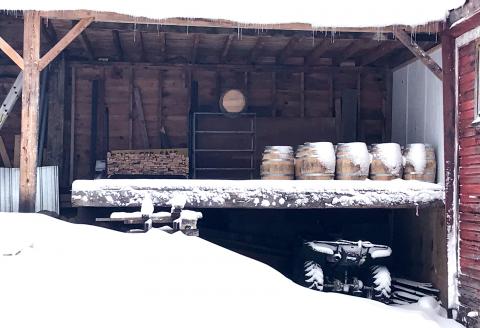Reviving the American Cooperage Tradition of Making Casks

Inside the 19th century Dinsmore Shop at Strawbery Banke Museum in Portsmouth, master cooper Ron Raiselis keeps alive the nearly lost art of handmaking casks. Once one of the most popular jobs in America, coopering— making and repairing wooden barrels and casks — is now viewed by many as a novelty profession or hobby.
Andy Fast, Extension state specialist for the forest industry, wants to change that.
“I’m trying to figure out how to reinvigorate a regional cooperage industry of an appropriate scale,” he explains. “Many local breweries and distilleries are interested in procuring local barrels but don’t have the means to do it.”
Fast is working with Raiselis as well as a cooper in Maine and one in Vermont to try to develop a viable niche forest products market that satisfies regional demand.
A Change in Production
The cooperage trade came to America with the first English settlers in the 17th century. Coopers made wooden containers that were instrumental for the home, for business and for trade. These containers held food, beverages and supplies — everything from grains, vegetables and fish to tobacco, gunpowder and beer.
By the mid-20th century, however, these wooden containers were replaced by materials like plastics, cardboard and stainless steel. New England could not produce barrels at competitive prices relative to other parts of the United States and their utility was relegated to the alcoholic beverage industry. A trade profession that relied upon apprenticeships soon became obsolete.
Certifying New England White Oak
Most casks are made from “American” white oak (Quercus alba), which is found throughout the eastern and central United States, but there is great variability within these growing regions. “You could have a barrel made of ‘American’ white oak, but that oak could be coming from 800 miles away,” Fast says.
A barrel is a cask that typically holds 53 U.S. gallons. Given the surge of the craft beverage industry in New Hampshire — which relies on barrels — Fast undertook a study to examine how New England’s white oak could be marketed as a unique product. For this, he turned to science.
The chemical composition of wood affects characteristics of the beverages held within the casks, such as the flavor, aroma and color.
With a European-based cooperage and UNH partners, Fast examined more than 50 white oak samples from New Hampshire, Vermont, Maine and Connecticut. He specifically looked at compounds known as trans-whisky-lactones, cis-whisky-lactones and tannins. The samples showed that this region’s white oak contains more trans-whiskey lactones and fewer tannins than Midwest white oak. Fast explained that a producer might prefer the characteristics of the New England product over the Midwestern product.
This has led him to register a certification mark with the United States Patent and Trademark Office to label New England white oak and market to local beverage producers as well as producers beyond New England. In fact, he has already shipped some certified New England white oak to Ohio. The driving force behind this effort is to increase the value of New England casks so the cooperage industry can sustainably reestablish itself.

Experimenting with Non-Oak Species
Beyond the white oak certification, Fast is also researching the viability of barrels produced from alternate hardwood species. He secured a small grant from the New England Society of American Foresters and went through UNH’s I-Corps training program — a National Science Foundation initiative that fosters entrepreneurship — to test beech, red maple and yellow birch.
Fast teamed up with several partners at the university, demonstrating how UNH research directly benefits business development for the state.
Under the direction of UNH woodlands manager Steve Eisenhaure, forestry students harvested samples and then sawed them alongside lecturer Mike Simmons. UNH woodworking helped prepare wood samples that were “toasted” and used in a beer flavoring experiment by the university’s brewing program.
Students ages 21 and over who are minoring in brewing sampled beer from the small containers made from different species and discussed their unique flavor profiles. Cheryl Parker, who oversees the UNH brewing program, invited head brewers from local commercial breweries to also weigh in with their tasting notes and commentary on possible pairings. Anecdotally, beech seemed like the best alternative to white oak.
Fast still has a lot more research to explore, but these preliminary trials suggest to him that there’s room for growth in this niche market of cask production, in which casks usually sell for $300-$400 per unit.
He has worked with stakeholders across the state (the beech he tested came from Berlin in Coös County) and even across international waters (the white oak samples were analyzed by Seguin Moreau in France).
“In addition to supporting the forest industry, this work is about helping people recognize the connection between cutting trees in a responsible way and using those resources for things we all use and enjoy,” he says.
Related Resource(s)
